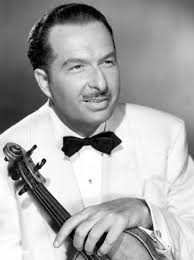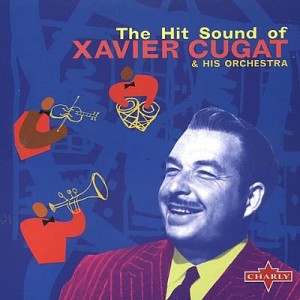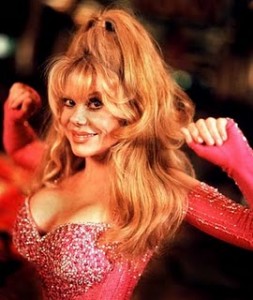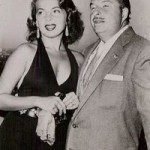 Xavier Cugat (English:[pronunciation?]; Catalan: [ʃəβiˈe kuˈɣat]; 1 January 1900 – 27 October 1990). His parents moved to Cuba when he was a child. He learned to play the violin at an early age. He was a bandleader who spent his formative life for years in Havana, Cuba. A trained violinist and arranger, he was a personality in the spread of Latin music in United States popular music. He was also a cartoonist. In New York, he was the leader of the resident orchestra at the Waldorf-Astoria before and after World War II.
Xavier Cugat (English:[pronunciation?]; Catalan: [ʃəβiˈe kuˈɣat]; 1 January 1900 – 27 October 1990). His parents moved to Cuba when he was a child. He learned to play the violin at an early age. He was a bandleader who spent his formative life for years in Havana, Cuba. A trained violinist and arranger, he was a personality in the spread of Latin music in United States popular music. He was also a cartoonist. In New York, he was the leader of the resident orchestra at the Waldorf-Astoria before and after World War II.
Cugat was born as Francisco de Asís Javier Cugat Mingall de Bru y Deulofeu (Catalan: Francesc d’Assís Xavier Cugat i Mingall de Bru i Deulofeu in Girona, Spain. His family emigrated to Cuba when Xavier was five. He was trained as a classical violinist and played with the Orchestra of the Teatro Nacional in Havana. On 6 July 1915, Cugat and his family arrived in New York as immigrant passengers on board the S.S. Havana. Cugat appeared in recitals with Enrico Caruso, playing violin solos.
Entering the world of show business, he played with a band called The Gigolos during the tango craze. Later, he went to work for the Los Angeles Times as a cartoonist. Cugat’s caricatures were later nationally syndicated. His older brother, Francis, was an artist of some note, having painted the famous cover art for F. Scott Fitzgerald’s novel, The Great Gatsby.
Hollywood and New York.
In the late 1920s, as sound began to be used in films, Cugat put together another tango band that had some success in early short musical films. And by the early 1930s, he began appearing with his group in feature films. His first notable appearance occurred in 1942, in the Columbia production You Were Never Lovelier with Rita Hayworth, Fred Astaire, and Adolphe Menjou.
Most of Cugat’s subsequent movies were made at Metro-Goldwyn-Mayer studios, including Week-End at the Waldorf (1945), Holiday in Mexico (1948), A Date with Judy (1948), Luxury Liner (1948), and the Esther Williams musicals Bathing Beauty (1944), This Time for Keeps (1947), On an Island with You (1948), and Neptune’s Daughter (1949).
In 1931, Cugat had taken his band to New York for the 1931 opening of the Waldorf Astoria Hotel, and he eventually replaced Jack Denny as the leader of the hotel’s resident band. For 16 years, Cugat helmed the Waldorf-Astoria Hotel’s orchestra, shuttling between New York and Los Angeles for most of the next 30 years.
One of his trademarks was to hold a Chihuahua while he waved his baton with the other arm.
Recordings.
Cugat recorded on Columbia Records (1940s and 1950s, also Columbia’s Epic label), RCA Victor (1930s and 1950s), Mercury Records (1951–1952 and 1960s) and Decca Records (1960s). Dinah Shore made her first recordings as a vocalist with Cugat in 1939 and 1940 (Victor Records). In 1940, his recording of “Perfidia” became a big hit. Cugat followed trends closely, making records for the conga, the mambo, the cha-cha-cha, and the twist when each was in fashion. Several of the songs he recorded, including “Perfidia”, were used in the Wong Kar-wai films Days of Being Wild and 2046. In 1943, “Brazil” was a big hit, reaching No. 17 in the Billboard Top 100.
Personal Life. Marriages
Cugat was married five times. His first marriage was to Rita Montaner (1918–1920); his second was to Carmen Castillo (1929–1944); his third to Lorraine Allen (1947–52); his fourth to singer Abbe Lane (1952–64); and his fifth to Spanish guitarist and comic actress Charo (1966–78).
Partial discography.
http://youtu.be/8lWPg1A6Q_U
The Greatest RCA Sides (RCA Victor, ca. 1940s, 1950s; 2000 compilation)
Bread, Love and Cha Cha Cha (Columbia, ca. 1957)
The King Plays Some Aces (RCA Victor, 1958)
That Latin Beat (RCA Camden, 1959)
The Best of Cugat (Mercury, 1961)
Cugi’s Cocktails (Mercury, 1963)
Xavier Cugat & his orchestra — Personnel: Robert Jones, George Lopez, Richard Hoffman, Frank Berardi (tp), Joseph Gutierrez (tb), Henry Greher (frh), Gene Lorello, Luis Castellanos, John Haluko, Robert De Joseph, James English (sax), Rafael Angelo (p), Manuel Paxtot (b), Isabello Marerro (dm), Oswaldo Oliveira (timb), Otto Garcia (maracas), Otto Bolivar (bgo), Glenn E. Brown (marimba) (Glenn Brown is the father of Steve Brown) – New-York, June 20, 1951 – CO 45849 / Columbia CL 6213 2’50 he used a wooden guiro at times.

Death.
Cugat died of heart failure, at the age of 90, in Barcelona and was buried in his native Girona.
Agencies/Various/InternetPhotos/YouTube/TheCubanHistory.com
The Cuban History, Hollywood.
Arnoldo Varona, Editor.



 Xavier Cugat, musician, bandleader, cartoonist. (Havana)
Xavier Cugat, musician, bandleader, cartoonist. (Havana)

